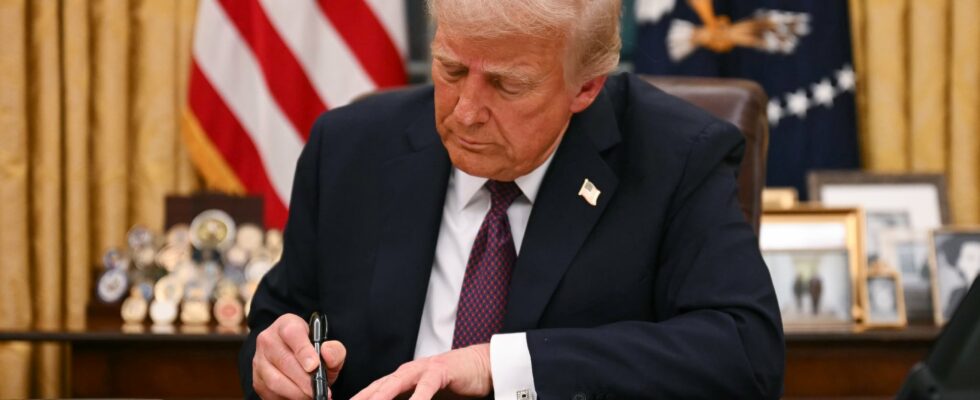Back at the White House, Donald Trump did not want to waste time. Well installed in the Oval Office this January 20, a few hours after his swearing in, he affixed his imposing black marker to his signature on a whole stack of presidential decrees, amassed on his desk. The staging is meticulous – an audience of journalists attends.
Among his decisions: a presidential pardon for the more than 1,500 attackers of the Capitol on January 6, 2021, the declaration of a state of emergency at the border with Mexico, or even the questioning of land law, even -there guaranteed by the Constitution. More than twenty texts are initialed, some of which provide for the unraveling of numerous decisions taken by his democratic predecessor.
A way for the new president to make his mark on this first day at the White House. On condition, however, that his presidential decrees are not challenged in court. “Some will be challenged in court on the grounds that the president does not have the power to take such measures under the Constitution or that his decisions are unconstitutional,” adds Richard Hasen, professor at UCLA School of Law in Los Angeles. The fate of each person will then depend on the outcome of this challenge before the judges.”
Legal battle
This judicial mechanism has already been launched. The day after he took office, two separate complaints were filed by a coalition of Democratic states, including California and New York, against the challenge to land law ordered the day before by the House. White. At issue: the violation of the 14th Amendment to the Constitution, which allows any individual born in the United States to obtain American nationality. “The president can’t take it away with the stroke of a pen, period,” said Matt Platkin, the New Jersey attorney general who is leading one of those actions. This Thursday, January 23, an American judge temporarily suspended this measure. The American president has already announced that his administration will appeal this decision.
This decree on calling into question land rights is, however, not the only one that could be lacking. The one ordering the administration to “make operational preparations” in the event that Donald Trump invokes the “Alien Enemies Act” of 1798 – which allows the detention and expulsion of foreign citizens without prior hearing – appears just as legally fragile . And for good reason: this 18th century law can only be invoked in time of war… “The various decrees relating to immigration are the first to be the subject of a series of legal challenges since they will quickly modify how immigration agencies enforce the laws,” said Jonathan Adler, professor at Case Western Reserve University School of Law.
The unknown of the Supreme Court
Already in 2017, the challenge to the “Muslim Ban” before the courts – which aimed to prohibit the entry into the United States of nationals of six Muslim countries – had forced his administration to review its copy on several occasions. But in this looming legal battle, not all appeals will succeed. Especially since in the event of a dispute, it is ultimately up to the Supreme Court, with a conservative majority, to decide. “Donald Trump’s bet is that in the end, the Supreme Court, of which he has appointed three members, will take up these cases and agree with him,” said Soufian Alsabbagh, specialist in American domestic politics.
Will she risk it? “It is certainly conservative, but has tended to limit the president’s ability to make significant political changes without the agreement of Congress, objects Jonathan Adler. We should not believe that the Supreme Court will let President Trump do everything that ‘he wants.’ The answer to this question will in any case have a determining influence on its room for maneuver over the next four years.
A Congress not so acquired
Beyond the judiciary, the game could also be more complicated than it seems in Congress for the Republican camp. After putting obstacles in the way of the Democrats throughout Joe Biden’s mandate, the “filibuster” mechanism (obstruction, in French) could this time hinder the action of the Trumpists. “This is a procedural rule of the Senate which requires a supermajority of 60 senators out of 100 to vote on most legislative texts,” explains Professor Jonathan Adler. Which the 53 seats in the hands of the Republicans do not allow to overcome, despite their majority in the upper house.
If such a rule does not exist in the House of Representatives, the very narrow Republican majority (three votes out of 435) also offers very few defections to the Grand Old Party (GOP) on the texts that it put on the agenda. In addition to increasing the pressure before the mid-term elections scheduled for 2026. “With only three seats difference, it is not impossible for the Democrats to manage to regain the majority in two years, points out Soufian Alsabbagh. Donald Trump would therefore face a Democratic House which would constitute an important safeguard to his power. Faced with this situation during his first mandate between 2019 and 2021, he experienced two impeachments.
.
